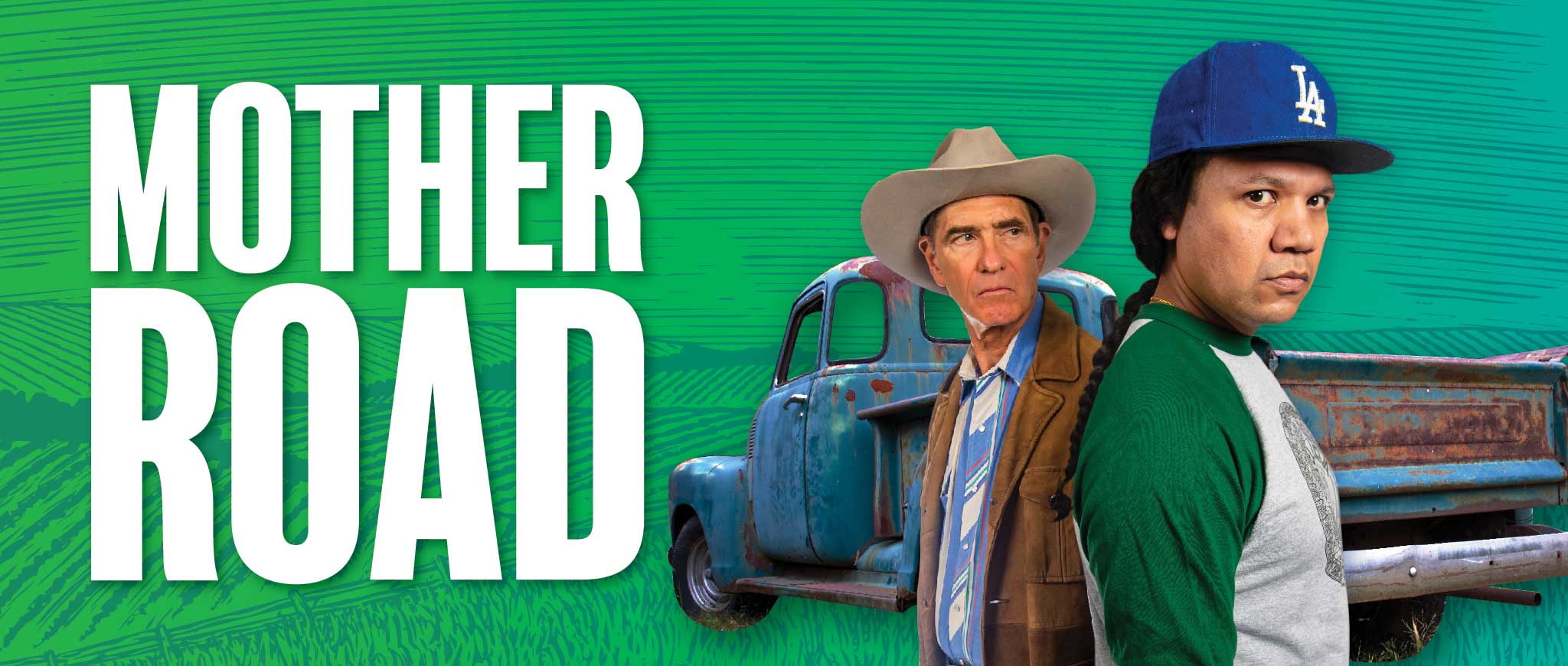The name John Steinbeck evokes images of the hay-field covered American southwest, the Dust Bowl, hungry children with dirty faces, and men and women scarred by depression and poverty. Where Grapes of Wrath left off, a new, more hopeful tale is reimagined by American-born, Latino playwright Octavio Solis. His new play, Mother Road, will kick off the return to theater with San Diego Repertory’s run October 7-31.
In a phone interview with Octavio Solis this week, the playwright shared his own journey from actor, to writer, to light designer, as well as his physical trek from El Paso, Texas to Ashland, Oregon. Early in Solis’ acting career, Solis was cast in The Diary of Anne Frank. Performing in high school plays and serving as Drama Club president confirmed that he was “stagebit.” The bug continued to gnaw at Solis through college and into graduate school, often landing him the lead roles in each production. Finding that he also had a facility for writing and directing plays, as well as light design, Solis was confused as to why he had trouble being cast in acting roles after graduating. He knew he was an actor, yet was it his baby face that kept him from being selected in these auditions? If the Universe was sending him a message, he wasn’t receiving it.
To pay bills, Solis began teaching playwriting in Dallas and supplemented his income with bartending. He continued to study more and was inspired by the plays written by his students. In 1984, playwright Eric Overmeyer wrote “Native Speech,” which “played with language and spun my head around.” The play contained rich visual imagery and introduced a hip language that grabbed Solis’ attention. He was writing plays like this and used them as vehicles to cast his students in his productions. Convincing his boss at the 500 Cafe to allow him to create Words on Wednesday, Solis had found a venue and a home in this New Wave/Punk club setting. He would write short funky poetic dramas with music and his students and other actors would perform in exchange for an open bar. They were not paid by the club’s owner, but Solis made sure they received some recompense in addition to the free drinks! In this setting, the playwright wrote and directed plays, and in this way, he was discovered by the Dallas theater community! “Finally, I got it!” Solis said. “I must be a playwright!”
Teatro Dallas asked Solis to write a play for their group of “brown people.” Man of the Flesh prompted his metamorphosis, and Solis went on to write Dia de los Muertos and Don Juan. “Latino actors came out of the woodwork. It was the first time I’d seen actors who looked like me, spoke my words, and I was hungry for it.” Solis gave up his acting career and dedicated himself to writing.
In 2017, Disney’s Pixar film Coco was released. Solis told me he was honored and so proud to be the cultural consultant and to participate in rough versions of the film. He felt exceedingly excited that this film was a landmark, signaling the global acceptance of Latino/Mexican Americans.
Growing up in El Paso, Solis was an avid reader of all of the American literary giants. He is a fan of Dickinson, Poe, Steinbeck, and Faulkner, but spoke of the dearth of Latino authors during his formative years. He has also studied Shakespeare and is involved in the Cal Shakes, or California Shakespeare Theater, a regional theater in the San Francisco Bay area.
Resignedly, Octavio Solis told me that he feels the issues facing Latinos have not changed and he doesn’t anticipate that they will change until Mexicans claim the majority population of the United States. “The border will never change. Through every administration from Johnson, Clinton, Bush, the culture spawned by friction has been created by the border.”
I asked Solis what he thought Steinbeck would think of Mother Road. In writing this play, Solis felt he really got inside of Steinbeck and was moved by the level of empathy. Steinbeck “so aptly expresses the sentiments, anguish, and joys of disenfranchised people. He connects deeply with them. When Steinbeck is writing from a Mexican perspective he is supremely humane and never depicts them as the outsider, rather he is inside looking out. He did the same with migrants from Oklahoma. I believe I take on the same mantle, writing from everyone’s internal perspective.” Solis sees Mother Road as everybody’s story. “It widens the parameters of my heart to feel everybody’s anguish, loneliness, dreams. It’s not just about Latinos. Everyone needs a place to call home and experience a connection to the earth. I feel my play is like a grafted apple tree.”
Speaking with this prolific playwright, I’m even more excited about the reopening of the San Diego Rep and traveling along with the Joads as they traverse Route 66 to the family homestead in Oklahoma.
Tickets may be purchased at sdrep.org or 619.544.1000 Proof of vaccination and masks are required for admission.
Republished from San Diego Jewish World


























